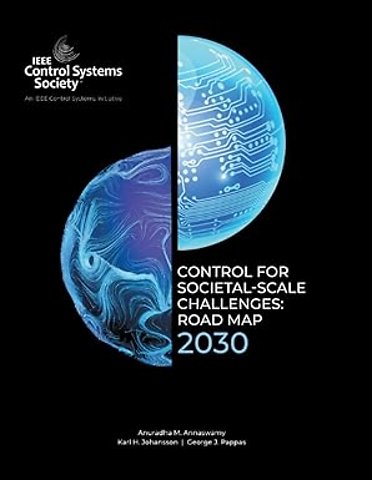Control for Societal-scale Challenges: Road Map 2030
Samenvatting
The field of control systems applies specific principles and methods to control dynamic systems so that they produce desired outcomes. The scope of this field has been gradually enlarging as the world embraces a digital way of life. Information enriched by various degrees of analytics to inform decision-making is moving beyond engineering into financial services, socioeconomic analysis, entertainment and sports, and political and social sciences. Increased levels of automation are sought after in various sectors and being introduced into new domains. All of these advances and transformations urge a shift in the conversation toward how control systems can meet grand societal-scale challenges. This is the focus of this Control for Societal-Scale Challenges: Road Map 2030.
The document seeks to chart a road map for the evolution of control systems, identifying social areas where our discipline can have an impact over the next decade. We begin with a discussion of major societal drivers, the role of control systems therein, and emerging technological trends that enable the implementation of control systems. We delineate a few methodological directions in control systems that have recently emerged, as well as needs and pathways for ensuring validation of emerging methods and technology transition. We also provide insight into new workforce education and training curricula to address and implement the solutions and methods identified.
The societal drivers we address span climate change, healthcare for quality of life, smart infrastructure systems, the economy of sharing, and resilience in societal-scale systems. While these societal drivers discussed in Chapter 2 introduce challenges, technological trends outlined in Chapter 3 provide opportunities for control systems to address some of these challenges and outline new ones in AI and big data, electrification of everything, engineering biology, and robotics in the real world. The challenges and opportunities in Chapters 2 and 3 lead to the investigation of new methods and concepts in control systems, some of which are outlined in Chapter 4. These include learning and data-driven approaches, methods for safety-critical systems, resilient cyber-physical systems (CPS), cyber-physical-human systems (CPHS), and novel control architectures. In each case, near-term and far-term challenges are outlined.
Chapter 5 articulates technology validation with a focus on control implementation and demonstration of impact. This chapter also points out the importance of engaging industry in the overall conversation of advanced control technologies and their tangible benefits in various applications that could benefit society. Recognizing that education is the cornerstone for the growth and prosperity of the control systems field, Chapter 6 discusses university curriculum changes. It provides specific suggestions on what concepts and methodologies should be emphasized and how to adapt to a new generation of students. Chapter 7 emphasizes that the control systems community has an important role to play in future technology designs that respect human rights and human values, ensure ethics and fairness, and meet regulatory guidelines, even while safeguarding our environment and our natural resources. Finally, Chapter 8 summarizes the recommendations made in previous chapters. We end with Epilogue, a section that describes the genesis and evolution of this roadmap, Acknowledgments that list all contributors and sponsors, a Glossary of keywords, and an Index.
Specificaties
Net verschenen
Rubrieken
- aanbestedingsrecht
- aansprakelijkheids- en verzekeringsrecht
- accountancy
- algemeen juridisch
- arbeidsrecht
- bank- en effectenrecht
- bestuursrecht
- bouwrecht
- burgerlijk recht en procesrecht
- europees-internationaal recht
- fiscaal recht
- gezondheidsrecht
- insolventierecht
- intellectuele eigendom en ict-recht
- management
- mens en maatschappij
- milieu- en omgevingsrecht
- notarieel recht
- ondernemingsrecht
- pensioenrecht
- personen- en familierecht
- sociale zekerheidsrecht
- staatsrecht
- strafrecht en criminologie
- vastgoed- en huurrecht
- vreemdelingenrecht

